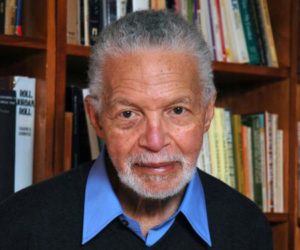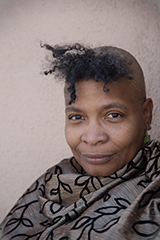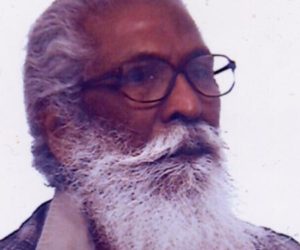

 Peter Kempadoo
Peter Kempadoo
by Petamber Persaud
It is ironic in our patriarchal society that the celebration of fathers as in Father’s Day is not as big an event as say Mother’s Day. Without getting bogged down in a debate, this article will focus on a few writers in Guyanese Literature who fathered other writers in conjunction to fathering and producing their own literary children and will focus on those fathers whose biological off springs also produced outstanding works of creation.
The father* of Lisa St. Aubin de Teran
Jan Carew was a writer, educator, thinker, philosopher, diplomat and activist who made his mark wherever he worked and lived – Trinidad, London, Spain, Ghana, Canada, Mexico, USA, Czechoslovakia, France and Guyana. And he discharged his responsibilities with the singular fixation to right wrongs of discrimination, marginalisation and even gender inequity, fighting the ‘same cause’ by re-writing and righting history.
Carew is best known for his novel ‘Black Midas’, first published 1958. Jan Carew wrote extensively for children as teacher to student, opening their eyes to facts of life and myths, sometimes a fusion of Amerindian and African lore, giving life to history producing such gems are ‘Children of the Sun’, ‘Amalivaca’, and ‘The Sisters and Manco’s Stories’.
His other writings including novels, memoirs and plays like ‘The Wild Coast’, ‘The Last Barbarian’, ‘Moscow is not my Mecca’, ‘Ghosts in my Blood’, ‘University of Hunger’, ‘Black Horse, Pale Rider’, ‘Street of Eternity’, ‘Sea Drums in my Blood’, and ‘The Day of the Fox’
Lisa St. Aubin de Teran is described as a ‘writer of autobiographical fictions, and memoirist’, immortalizing the many places in which she lived in The Slow Train to Milan, The Hacienda, and Mozambique Mysteries.
The father* of Denise Harris
Wilson Harris is the recipient of five honorary doctorates. In 1968, he obtained an Arts Council Grant, and in 1971, he was a Commonwealth Fellow in Caribbean Literature at Leeds University, UK. He held the revered position of writer-in-residence at many universities around the world including places like Australia, New York, Texas, Toronto and Cuba. In 1987, he won the inaugural Guyana Prize for Literature in the fiction category and in 2002 he was awarded the Guyana Prize Special Award. In 2003, the University of Warwick staged a conference in honour of Harris. In 1968, Wilson Harris was a delegate to the National Identity Conference in Brisbane and in the same year, he was a delegate to UNESCO symposium on Caribbean Literature held in Cuba. In 1970, he was part of the Convention of Caribbean Writers and Artists held in Guyana planning for what turned out to be the Caribbean Festival of Arts (Carifesta). Some of his poems were collected in three volumes; FETISH, 1951, ETERNITY TO SEASON, 1952, and THE WELL AND THE LAND, 1952. He has written numerous essays on topics including ‘The Enigma of Values’, ‘Fossil and Psyche’, ‘Greatness and Bitterness’ and ‘The Making of a Book’. Wilson Harris has written and published some twenty three novels since his first, PALACE OF THE PEACOCK, appeared in 1960.
Denise Harris, born in Georgetown, Guyana, is widely-travelled; her attachment to UNICEF has taken her to places like Barbados, Jamaica, New York and Beijing. Her first novel, WEB OF SECRETS, won the Guyana Prize for Literature, 1996, in the category of best first book of fiction. The book is ‘fictional autobiography’ dealing with issues from which people shy away; it gives ‘a picture of a sensitive child suffering considerably from the stress of marital breakdown, the African-Indian racial violence of early 1960’s Georgetown and the failure of the family to confront the racial tensions within it’. It is also a novel of redemption. Her second novel, IN REMEMBRANCE OF HER, was short-listed for the Guyana Prize in 2004. She is also a photographer.
The father* of Nalo Hopkinson
Abdur-Rahman Slade Hopkinson was a man of many parts: New Amsterdam, Berbice, Georgetown, Guyana, Barbados, Jamaica, Trinidad and North America; parts of the world in which he lived. He was a head teacher, university lecturer, journalist, poet, actor, playwright and painter. ‘THE FOUR and other poems’, his first collection, was published in Barbados in 1954. During the sixties, he became a Muslim, reflected in his later writing and, in 1970, he founded the Caribbean Theatre Guild. ‘THE MADWOMAN of PAPINE and ‘THE FRIEND’ were published by Curriculum Development Centre, Ministry of Education & Social Development, Guyana, in 1976. His plays include ‘Sala’ and ‘The Long Vacation’. His short story, ‘Marcus Aurelius and the Transatlantic Baakoo’ was published in the Faber Book of Modern Caribbean Short Stories. Slade Hopkinson died in 1993, the same year his final collection of poems, ‘SNOWSCAPE with SIGNATURE’ was published.
Nalo Hopkinson is among the first science-fiction writers of the Caribbean. She has lived in Jamaica, Trinidad and Guyana and for the past 30-odd years in Canada. She is the author of three novels and a short story collection (BROWN GIRL IN THE RING, MIDNIGHT ROBBER, THE SALT ROADS, SKIN FOLK). Her work has received numerous awards including the Warner Aspect First Novel Prize, the Ontario Arts Council Foundation Award for emerging writers, the John W. Campbell Award for best new writer, the World Fantasy Award, and the Gaylactic Spectrum Award. Her novel MIDNIGHT ROBBER was given Honourable Mention in Cuba’s “Casa de las Americas” literary prize and is a New York Times Notable Book of the Year 1999. She has served as Writer-in-Residence in many colleges and universities around the world including places like Australia, USA, London, and in Canada.
The father* of Oonya Kempadoo
Peter Kempadoo is the first Guyanese of Indian ancestry to write a novel. That book, GUIANA BOY, was self-published in 1960 by a small press, New Literature (Publishing) Limited, founded by Kempadoo. This first novel was well received. But his second novel, OLD THOM’S HARVEST, also set on the Corentyne Coast of Guyana was scoffed at because of his exploration of the Indian man and African woman relationship at a time when society was not ready to accept miscegenation from the other end of the spectrum. Kempadoo for most of his life was a self-taught, self-made man. But he benefited from early formal education. A certified teacher and a trained nurse, Kempadoo put his talent to others uses and excelled as a reporter and broadcaster. And despite his contribution to Guyanese literature, Kempadoo still refers to himself as an accidental writer.
Oonya Kempadoo grew up in Guyana, lived in various parts of Europe and on many islands of the Caribbean. Her first novel, BUXTON SPICE, was an instant success. It was on the London bestseller list throughout 1999, nominated for the 2000 International IMPAC Dublin Literary Award, and won her the label ‘a Great Talent for the Twenty-First Century’ by the Orange Prize judges. The novel was translated in French, Italian, Dutch, Spanish, Portuguese and Hebrew. Her second novel, TIDE RUNNING, won the Casa de las Americas literary prize of Cuba. Both novels explored sexuality in youths. Her third novel is All Decent Animals.
Please forgive me if I missed your story – the story of you and your dad, and help me to correct this omission by sending relevant information, thank you.
*No slight intended to the mothers involved in giving birth to the above children.
Responses to this author telephone (592) 226-0065 or email: oraltradition2002@yahoo.com (Guyana Times Sunday Magazine)



